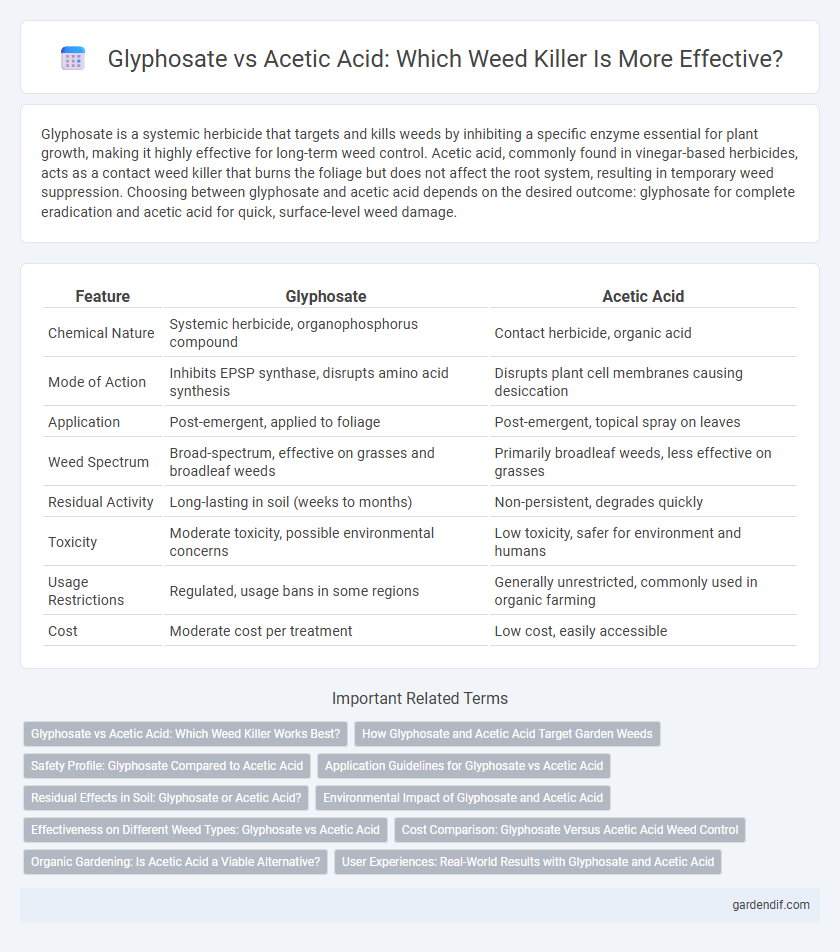
Glyphosate vs acetic acid Illustration
Glyphosate is a systemic herbicide that targets and kills weeds by inhibiting a specific enzyme essential for plant growth, making it highly effective for long-term weed control. Acetic acid, commonly found in vinegar-based herbicides, acts as a contact weed killer that burns the foliage but does not affect the root system, resulting in temporary weed suppression. Choosing between glyphosate and acetic acid depends on the desired outcome: glyphosate for complete eradication and acetic acid for quick, surface-level weed damage.
Table of Comparison
| Feature | Glyphosate | Acetic Acid |
|---|---|---|
| Chemical Nature | Systemic herbicide, organophosphorus compound | Contact herbicide, organic acid |
| Mode of Action | Inhibits EPSP synthase, disrupts amino acid synthesis | Disrupts plant cell membranes causing desiccation |
| Application | Post-emergent, applied to foliage | Post-emergent, topical spray on leaves |
| Weed Spectrum | Broad-spectrum, effective on grasses and broadleaf weeds | Primarily broadleaf weeds, less effective on grasses |
| Residual Activity | Long-lasting in soil (weeks to months) | Non-persistent, degrades quickly |
| Toxicity | Moderate toxicity, possible environmental concerns | Low toxicity, safer for environment and humans |
| Usage Restrictions | Regulated, usage bans in some regions | Generally unrestricted, commonly used in organic farming |
| Cost | Moderate cost per treatment | Low cost, easily accessible |
Glyphosate vs Acetic Acid: Which Weed Killer Works Best?
Glyphosate is a systemic herbicide that targets a wide range of weeds by disrupting their metabolic processes, ensuring long-lasting control, whereas acetic acid works as a contact herbicide that burns the foliage but lacks soil residual activity. Research shows glyphosate's effectiveness on deep-rooted, perennial weeds surpasses acetic acid, which is more suited for quick, above-ground weed suppression in small areas. For persistent weed management in agricultural or large-scale settings, glyphosate provides superior efficacy compared to the temporary effects of acetic acid.
How Glyphosate and Acetic Acid Target Garden Weeds
Glyphosate acts as a systemic herbicide by inhibiting the EPSPS enzyme critical for amino acid synthesis, effectively killing weeds from the roots. Acetic acid works as a contact herbicide, destroying plant cell membranes upon application but offers no residual control or root penetration. Understanding these distinct mechanisms helps gardeners choose between long-term weed suppression and rapid surface weed desiccation.
Safety Profile: Glyphosate Compared to Acetic Acid
Glyphosate exhibits a lower acute toxicity to humans compared to acetic acid, which is commonly found in vinegar-based herbicides and can cause skin and eye irritation upon contact. While glyphosate is classified as a probable human carcinogen by some agencies, regulatory authorities generally consider it safe when used according to label instructions. Conversely, acetic acid's rapid phytotoxic effects reduce long-term environmental persistence but increase immediate hazard risks to applicators and non-target organisms.
Application Guidelines for Glyphosate vs Acetic Acid
Glyphosate application requires precise timing with active weed growth and typically involves a concentration of 1-3% applied using foliar sprays, ensuring thorough coverage for systemic uptake. Acetic acid, used as a contact herbicide, demands higher concentrations (10-30%) and careful spot application to avoid crop damage, with effectiveness increased under dry, warm conditions. Proper adherence to label instructions, including protective equipment and buffer zones, is essential for both to minimize environmental impact and ensure effective weed control.
Residual Effects in Soil: Glyphosate or Acetic Acid?
Glyphosate exhibits longer residual effects in soil, persisting for weeks to months depending on environmental conditions, which can impact subsequent crop growth and soil microbial activity. Acetic acid, by contrast, breaks down rapidly, usually within days, minimizing soil residue but requiring more frequent applications for weed control. Choosing between glyphosate and acetic acid depends on the desired balance between residual weed suppression and soil health considerations.
Environmental Impact of Glyphosate and Acetic Acid
Glyphosate, a widely used herbicide, persists in soil and water, leading to potential toxic effects on aquatic ecosystems and soil microorganisms, whereas acetic acid breaks down rapidly, minimizing long-term environmental contamination. Studies show glyphosate can disrupt microbiomes and contribute to herbicide-resistant weed populations, while acetic acid's organic nature results in less bioaccumulation and lower risks for non-target species. The environmental profile of glyphosate raises concerns over groundwater pollution and biodiversity loss, contrasting with the relatively benign impact of acetic acid when used as a contact herbicide.
Effectiveness on Different Weed Types: Glyphosate vs Acetic Acid
Glyphosate exhibits high effectiveness against a broad spectrum of perennial and deep-rooted weed species by inhibiting the EPSPS enzyme crucial for plant growth, making it ideal for long-term control. Acetic acid provides rapid desiccation of annual and shallow-rooted weeds through cell membrane disruption but offers limited residual activity and is less effective on established perennials. Variability in weed type and growth stage determines the optimal herbicidal choice, with glyphosate favored for systemic control and acetic acid for quick knockdown of young, less resilient weeds.
Cost Comparison: Glyphosate Versus Acetic Acid Weed Control
Glyphosate offers a cost-effective solution for large-scale weed control due to its low application rates and high efficacy, often resulting in lower overall expenses compared to acetic acid. Acetic acid, commonly used as a natural herbicide, requires higher concentrations and more frequent applications, increasing material and labor costs. Budget-conscious farmers and landscapers typically favor glyphosate for its long-lasting impact and reduced need for repeated treatments.
Organic Gardening: Is Acetic Acid a Viable Alternative?
Acetic acid serves as an effective organic herbicide by targeting the cell membranes of weeds, making it a favorable alternative to glyphosate in organic gardening. Glyphosate, a systemic herbicide, inhibits the EPSPS enzyme but poses environmental and health concerns due to its persistence and potential toxicity. Organic gardeners prefer acetic acid for its biodegradable properties and reduced soil impact, despite requiring more frequent applications and careful handling.
User Experiences: Real-World Results with Glyphosate and Acetic Acid
User experiences with glyphosate often highlight its effectiveness in killing a wide range of stubborn weeds with lasting results, though concerns about chemical exposure prevail. Acetic acid, favored for organic or less toxic weed control, provides quicker visible effects but may require repeated applications for persistent weed management. Real-world results show glyphosate excels in long-term control, while acetic acid suits small-scale or environmentally sensitive areas.
Glyphosate vs acetic acid Infographic

 gardendif.com
gardendif.com